|
|
|
Sort Order |
|
|
|
Items / Page
|
|
|
|
|
|
|
| Srl | Item |
| 1 |
ID:
124608
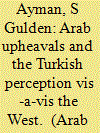

|
|
|
|
|
| Publication |
2013.
|
| Summary/Abstract |
The article argues that Turkey's perception of the West has been heavily influenced by its idealized identity. After evaluating the circumstances under which this idealized identity began to weaken, it shows how the images of the US and Europe have started to get compartmentalized and Israel separated from the image of the West. The article explains the relationship between the continuing process redefining Turkey's "personal identity" and its growing interest in the Middle East. The transformation process that Turkey is passing through is critically important in understanding the way in which Turkey has been affected by the upheavals and is reacting to the new developments in the region. In this vein the article highlights the interaction between power considerations and aspirations to re-define identity at home and abroad.
|
|
|
|
|
|
|
|
|
|
|
|
|
|
|
|
| 2 |
ID:
123966
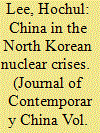

|
|
|
|
|
| Publication |
2013.
|
| Summary/Abstract |
China reacted very differently to the first and second North Korean nuclear crisis: engaging in passive and 'behind-the-scenes' diplomacy in the first and choosing more proactive and 'stage-managing' diplomacy in the second. This article has sought to explain this striking contrast in China's foreign behavior. Though most studies tend to rely on Chinese strategic and security interests in explaining China's proactive diplomacy as demonstrated in the six-party talks, those strategic and security interests do not explain directly the contrasting foreign behavior of China. China faced basically equal strategic and security concerns and equally dangerous potential military conflict between the US and North Korea through the first and the second nuclear crises. This article, then, argues that 'same interests, but different behaviors' should be explained not by China's external interest calculus but by internal changes within China itself. By the turn of the new millennium, China had undergone an evolutionary change of state identity from a cautious accommodator to an active constructor, or from a state of 'taoguang yanghui' to a state of 'fuzeren daguo'. The contrasting foreign behaviors in the first and second nuclear crises are profoundly reflective of this identity shift of China.
|
|
|
|
|
|
|
|
|
|
|
|
|
|
|
|
| 3 |
ID:
190964
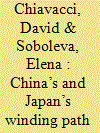

|
|
|
|
|
| Summary/Abstract |
In the early 1980s, the People’s Republic of China (PRC) and Japan joined the international refugee regime. This timing similarity is puzzling due to the stark differences between the PRC as a communist and authoritarian state versus Japan as a prime example of capitalist development and democratization. Moreover, although both signed the 1951 Refugee Convention and the 1967 Refugee Protocol without major reservations, neither of them has fully implemented these treaties. Discussions regarding the PRC’s and Japan’s engagement with the international refugee regime tend to start with the beginning of the Indochina refugee crisis in 1975. However, this article shows that the early decades of their interaction with the international refugee regime are of crucial importance for a full understanding of the timing and form of accession to the international refugee regime. Although the Southeast Asian refugee crisis played an important role as a trigger, it was the changing character of the international refugee regime and the transformations of state identity in both countries that set the ground for the signing of the refugee-related conventions.
|
|
|
|
|
|
|
|
|
|
|
|
|
|
|
|
| 4 |
ID:
155456
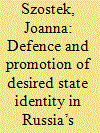

|
|
|
|
|
| Summary/Abstract |
This article examines how the Russian state promotes and protects its preferred self-identity, using the conceptual framework of ‘strategic narrative’. Nation branding practices, including state-funded ‘mega-projects’ like the Sochi Olympics, have contributed to the narrative by characterising Russia as a welcoming, attractive destination. However, a more salient feature of Russia’s strategic narrative is intense ‘anti-Western’ and ‘anti-American’ political and media discourse, formulated to defend against rival, threatening narratives projected from other countries. Through analysis of official statements and state television content, this article demonstrates how determination to protect ‘great power’ and ‘European’ identities underlay Russia’s strategic narrative in 2014. It considers responses which the narrative has prompted, arguing that desired results in domestic reception have been achieved at the expense of unsatisfactory results internationally. Heavy-handed attacks on the identities of other states boost collective self-esteem among Russian citizens, but they fail to produce – and arguably obstruct – desired responses among foreign audiences.
|
|
|
|
|
|
|
|
|
|
|
|
|
|
|
|
| 5 |
ID:
111923
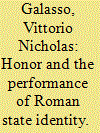

|
|
|
|
|
| Publication |
2012.
|
| Summary/Abstract |
Are the personal identities of elite decision makers a domestic source of state identity? This article explores this question and reveals how state identity was produced in the Roman world system during the early Principate.† The argument advanced proposes the Roman world was ensconced by a metavalue of honor that significantly shaped the personal identities of Rome's aristocratic decision-making classes. Competition for honor subsumed aristocratic life and shaped not only the personal identities of the elite, but also the persona of the Roman state. The Romans extrapolated their psychological framework, in which the stratification of domestic society rested on personal identities of honor, to their outlook on foreign policy. Akin to their domestic lives, those executing foreign policy conceptualized Rome as engaged in a status competition for honor with the polities existing its world system. Preserving and enhancing one's honor relative to others was fundamental in domestic life, and this was also the state's primary objective in relation to all others. The identity of the Roman state, therefore, was an aggressive status seeker.
|
|
|
|
|
|
|
|
|
|
|
|
|
|
|
|
| 6 |
ID:
142352
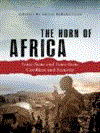

|
|
|
|
|
| Publication |
London, Pluto Press, 2013.
|
| Description |
xiv, 208p.: maps, figures, abbre.pbk
|
| Standard Number |
9780745333113
|
|
|
|
|
|
|
|
|
|
|
|
Copies: C:1/I:0,R:0,Q:0
Circulation
| Accession# | Call# | Current Location | Status | Policy | Location |
| 058414 | 963.072/BER 058414 | Main | On Shelf | General | |
|
|
|
|
| 7 |
ID:
122920
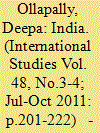

|
|
|
|
|
| Publication |
2011.
|
| Summary/Abstract |
This article argues that India's foreign policy preferences cannot be understood without referring to its state identity as it has evolved over time. The ambivalence that is evident throughout much of India's post-Independence history lies in deep-seated identity sources-a unique mixture of post-colonial nationalism, civilizational exceptionalism and secular democracy. India's identity has played out in foreign policy to place an inordinate amount of importance to strategic autonomy but with a normative aversion to power politics and use of force. This has led to an ambivalence that many observers find hard to understand. This orientation is now coming under increasing strain, because of the rise of a realist strand of thinking challenging the country's traditional normatively driven foreign policy outlook. Realist thinking is posing as a distinct alternative that calls for a more proactive and power infused policy stance. The rise of China in India's neighbourhood is giving greater weight to realist arguments. Although India's core value of strategic autonomy is still in force in Indian foreign policy, the article suggests that it is taking on a different form that is more nuanced, more flexible and adaptable. As such, India may now be particularly well positioned to play the role of a 'bridging power' more effectively, matching its state identity with a new evolving international role. India's membership in groups ranging from G-20 and Brazil, Russia, India, China and South Africa (BRICS) to India, Brazil, South Africa (IBSA) and ASEAN Regional Forum (ARF), and its being a serious contender for a permanent seat in the UN Security Council, gives India distinct opportunities and status to utilize a greater mix of soft and hard power options than in the past. India may well be at the moment of overcoming its historical ambivalence to power-driven policies and purposeful action.
|
|
|
|
|
|
|
|
|
|
|
|
|
|
|
|
| 8 |
ID:
055789
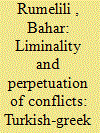

|
|
|
| 9 |
ID:
130905


|
|
|
|
|
| Publication |
2014.
|
| Summary/Abstract |
THE INTEGRATION PROCESSES, which have passed to the stage of concrete implementation in the Customs Union format, are now, in a sense, an indicator of stability for the member countries' national and state identity. A policy of ethnic tolerance and social solidarity ensures domestic stability. Kazakhstan's citizens are members of more than 100 ethnic groups and 17 religious confessions. Building a political nation has become the basis for shaping national andstate identity in Kazakhstan. A strong economy, ethnic and religious harmony, and patriotism are to be a response to the challenges of modernity.
|
|
|
|
|
|
|
|
|
|
|
|
|
|
|
|
| 10 |
ID:
181632
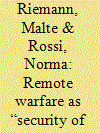

|
|
|
|
|
| Summary/Abstract |
This article analyses remote warfare from an ontological security perspective, arguing that remote warfare needs to be understood as a response to states’ internal self-identity needs. We develop this claim by analysing an emerging aspect of remote warfare: Security Force Assistance (SFA). SFA is aimed at building up the security forces of partners, sharing best practice, assisting in security sector reform, fostering collaboration, and overall contributing to conflict resolution. Focusing on the UK, we show how and why ontological security needs are a driving force behind the UK’s SFA program. We outline the UK’s specific autobiographical narrative, which we call a “global engagement identity,” explore the crises that induced ontological insecurity, and show how the UK’s SFA program can be read as a routinised foreign policy practice aimed at taming uncertainty and reinforcing ontological security. This paper makes three contributions. First, it analyses remote warfare through an ontological security framework, thereby moving the focus from “security-as-survival” to “security-of-being.” Second, it highlights the importance of SFA as a remote warfare tool. Third, it shows the centrality of ontological security in understanding UK defence policy.
|
|
|
|
|
|
|
|
|
|
|
|
|
|
|
|
| 11 |
ID:
160689
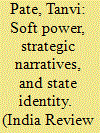

|
|
|
|
|
| Summary/Abstract |
In 2011, India and Afghanistan signed the Strategic Partnership Agreement that delimited cooperation in economic, social, political, and cultural areas. It depicted the rise of Indian soft power influence. However, the extent to which India garners strategic influence in Afghanistan through soft power remains contentious. This article contends that India’s soft power effectiveness in Afghanistan post-2011 can be fully grasped only via the construction and reception of India’s regional power identity negotiated at the sites of: “civilization,” “democracy,” and “economic-military” enabling India to provide a regional leadership that can forward both India and Afghanistan’s mutual interests. Examining soft power via the constructivist-discursive framework of collective identity strategic narrative, this article compares India-Afghanistan relations in periods 2011–14 and 2014–17. The former formalized strategic partnership agreement and the latter marked continuation of the agreement albeit through domestic political transitions in both countries. This article demonstrates that the Indian soft power influence in Afghanistan between 2014 and 2017 has increased markedly.
|
|
|
|
|
|
|
|
|
|
|
|
|
|
|
|
| 12 |
ID:
083662
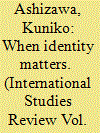

|
|
|
|
|
| Publication |
2008.
|
| Summary/Abstract |
Over the last decade, the international relations field witnessed a surge in literature dealing with the concept of identity, a trend that is likely to continue. At the same time, the multi-directional focus of the current identity literature, together with the rather loose application of the term "identity", leaves some observers sceptical about the validity and utility of identity as an analytical concept. With this backdrop, the article seeks to articulate an essential mechanism by which identity functions as a source of a state's foreign policy: A concept of state identity generates a specific value (a pro attitude toward a certain kind of action), which in turn determines a state's preference for a particular foreign policy option. This causal mechanism is then demonstrated by the empirical analysis of Japan's foreign policy toward post-Cold War regional institution-building. Further, by placing the identity mechanism within the value-action framework of general foreign policy, the study raises concern about the conditions by which identity becomes a prominent factor, that is to say when identity matters. Along this line, the study highlights the context-dependent and versatile natures of identity's function, and therefore, it cautions against overly deterministic approaches toward the role of identity in foreign policy and international relations.
|
|
|
|
|
|
|
|
|
|
|
|
|
|
|
|
|
|
|
|
|